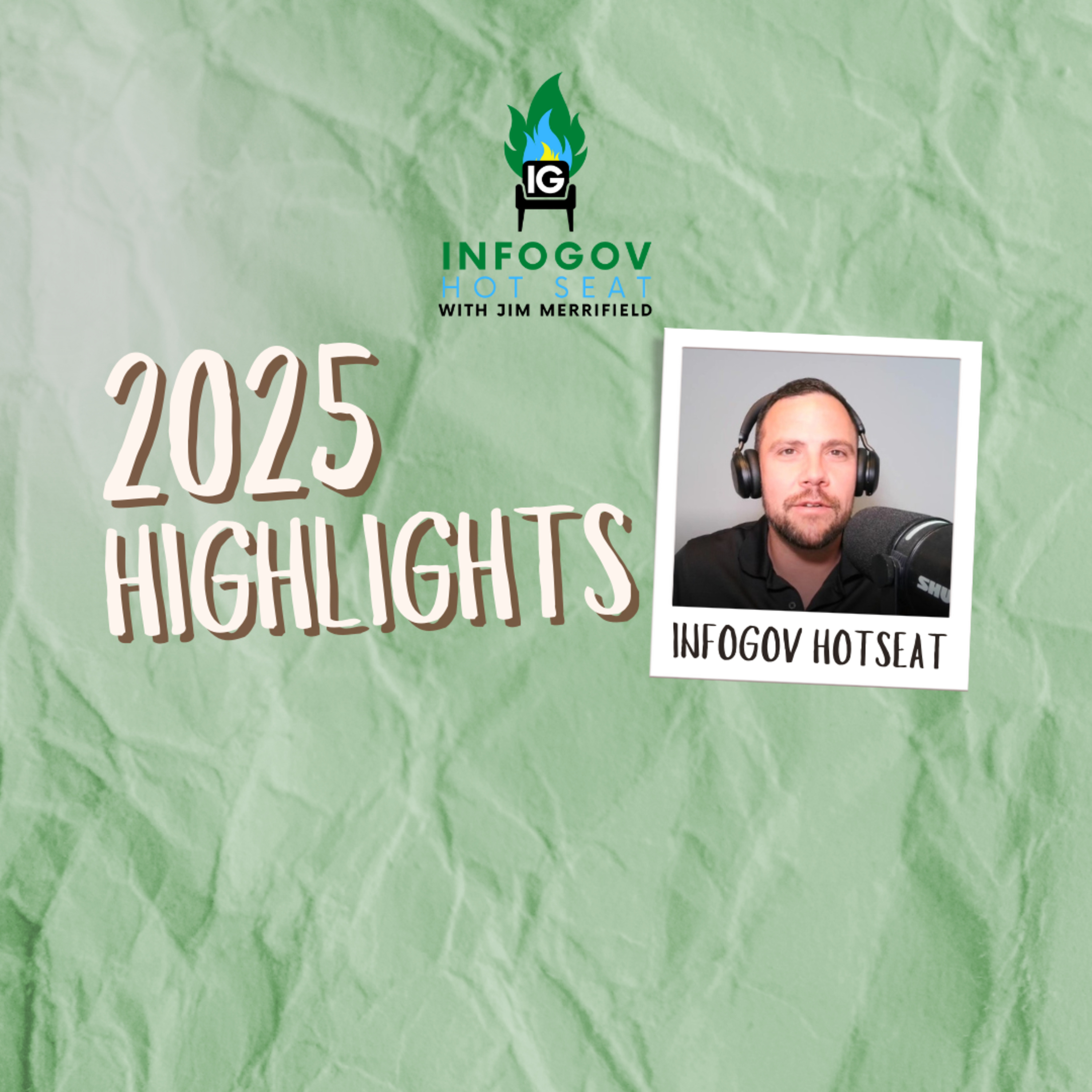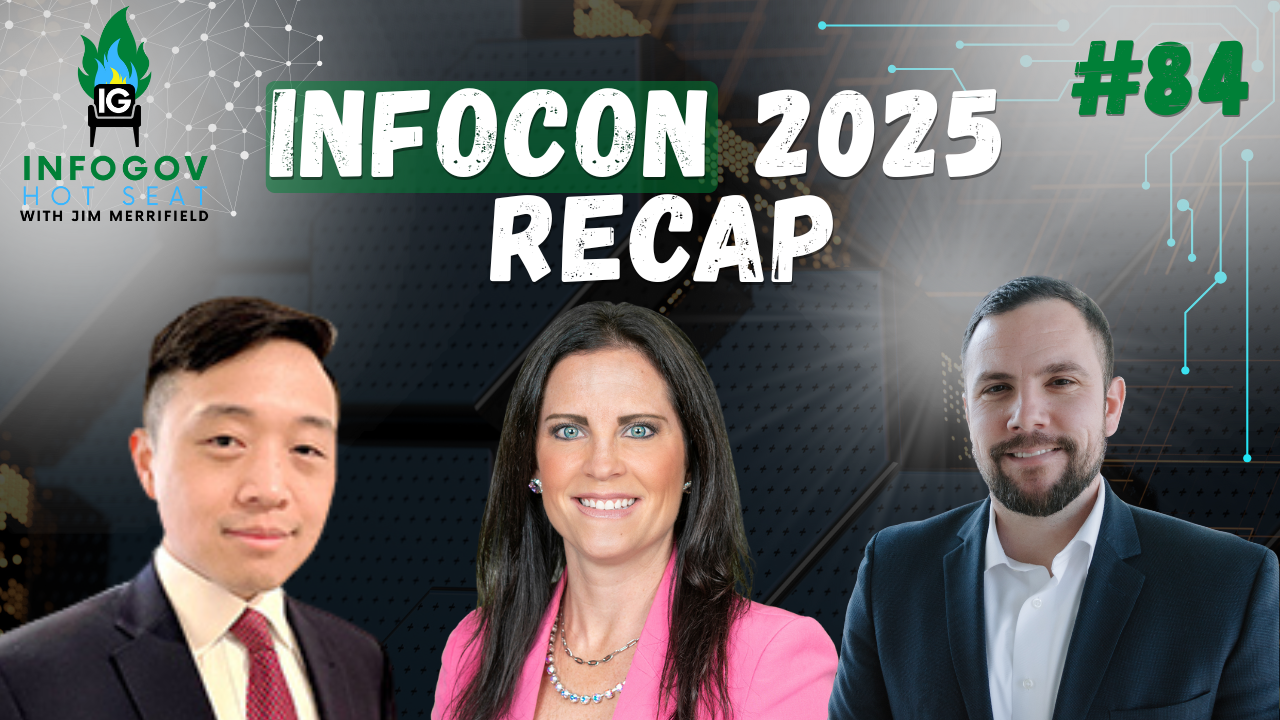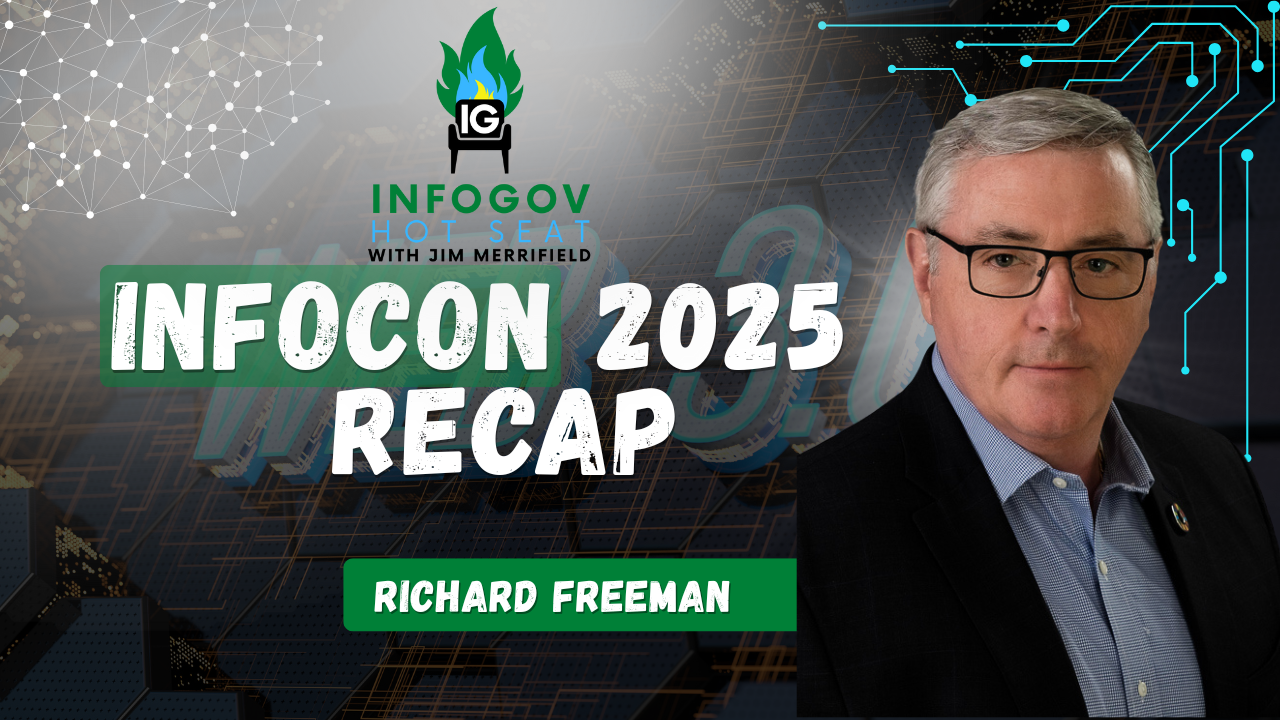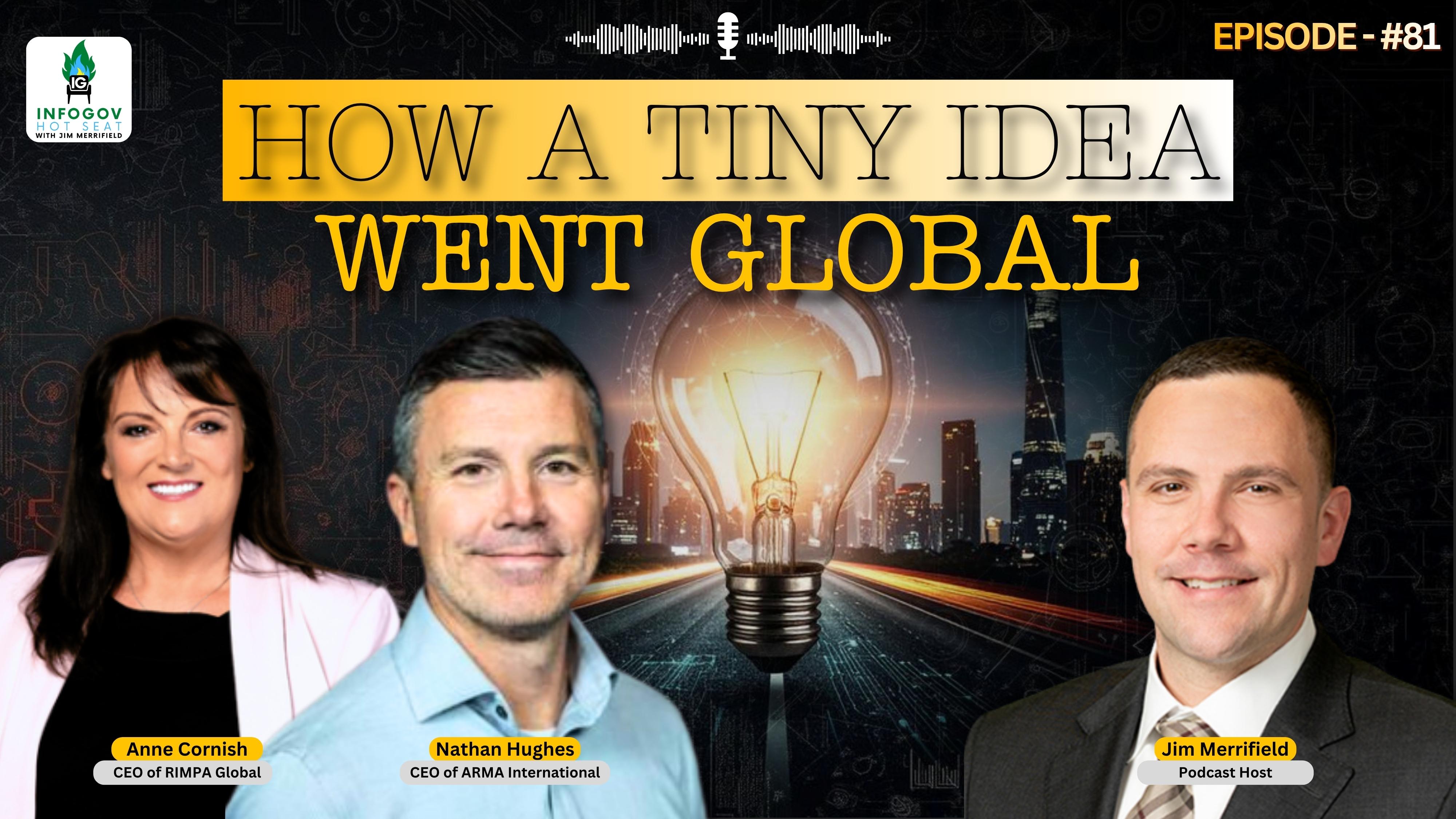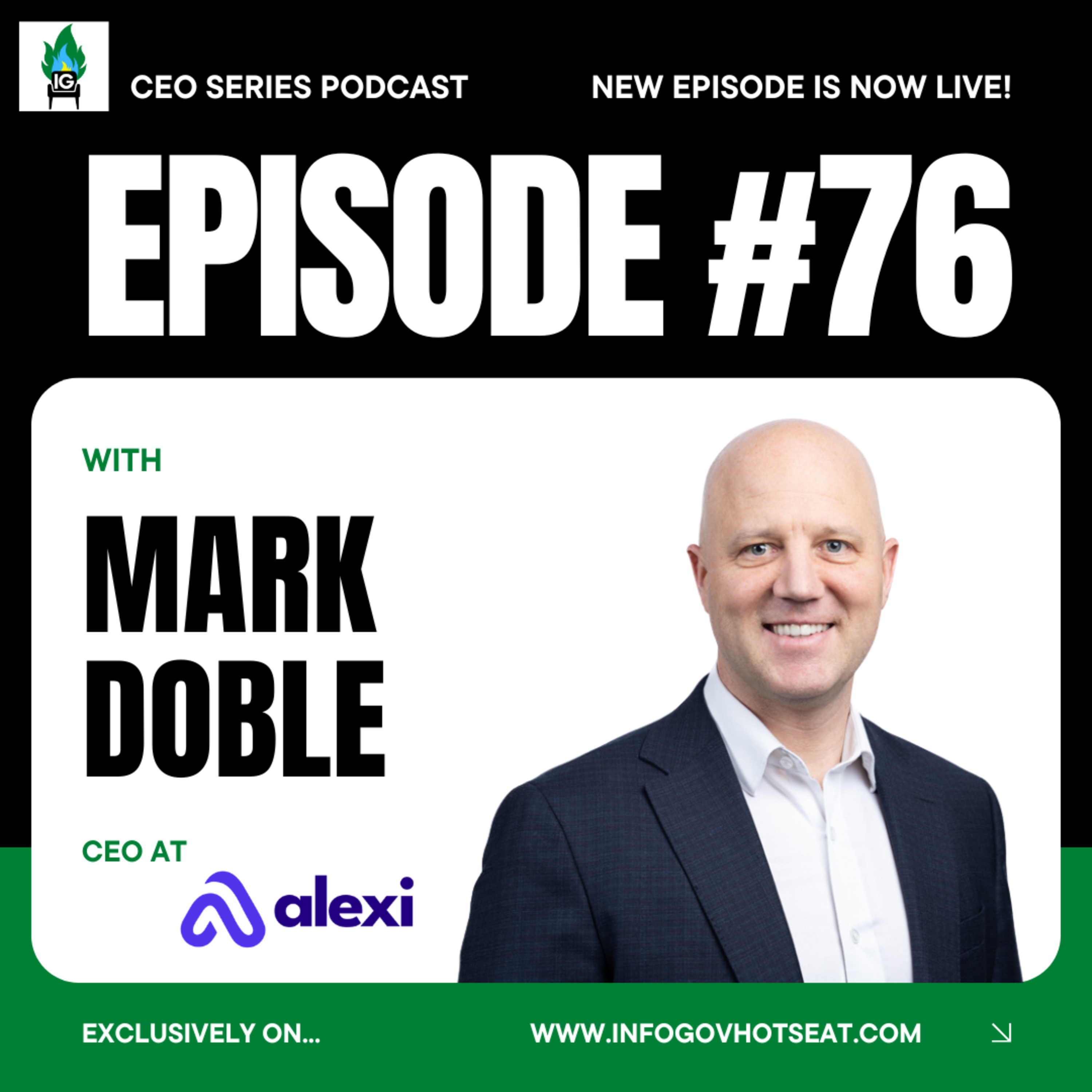Fourth Quarter: Culture Always Scores
In this episode of the InfoGov Hot Seat Podcast, host Jim Merrifield and guest Kim Tran discuss the real compliance challenge, emphasizing that the key issues lie in people and culture rather than just policies and checklists. They explore why compliance efforts often fail, the disconnect between policies and organizational culture, and share real-world examples of compliance misalignment. The conversation concludes with actionable recommendations for fostering a culture that prioritizes compliance, highlighting the importance of communication and shared goals within organizations.
Jim Merrifield (00:01.634)
Well, hello and welcome to another episode of the InfoGov Hot Seat Podcast. I'm your host, Jim Merrifield, and today we're starting an incredible three-part series that's going to challenge the way you think about governance, compliance, and culture. So I'm thrilled to kick things off with the first part of the series titled, The Real Compliance Challenge, People and Culture, Not Policies and Checklists.
We're zooming in on why compliance efforts often fall short despite all the policies and checklists in the world and spoiler alert, it's not about paperwork. So joining me today is someone whose insights I've admired for quite some time. She's a powerhouse in the governance and compliance space with a knack for aligning people, processes and policies in a way that drives real change. So please welcome Kim Tran to the hot seat.
Kim Tran (00:55.493)
Thank you, Jim. It's great to be here. I'm excited for today's conversation.
Jim Merrifield (01:03.138)
Yeah, we're so glad to have you, Kim. You bring such a unique perspective to governance and compliance. And I know our listeners are going to gain so much from today's discussion. But before we jump into the meat of the episode, why don't you tell us a bit about yourself and your work for anyone who might not be familiar with who you are.
Kim Tran (01:24.699)
Yeah, of course. Thank you. So I've been in marketing and business development, especially for highly regulated industries for over a decade now. I started with a PR and marketing automation software company. And so it's been pretty interesting because since then AI has come on board and into the mass public and all of that. So it's been really cool to see something like that go public.
Prior to marketing, I actually started off my career thinking I wanted to become a lawyer. I worked at the law firm of Davis Wright Tremaine, and it was a really great starting point for my career, especially as a marketer, because there's so much strategy that comes into the law, and legal is just one of those fields that is being transformed by AI. And so having that background has been really awesome and just...
you know, really life changing, really.
Jim Merrifield (02:29.112)
That's fantastic. Such a great background. I love that you're quote unquote a recovering lawyer. So.
Kim Tran (02:35.835)
Former aspiring lawyer. Yep.
Jim Merrifield (02:41.976)
There you go, aspiring lawyer. I like that. listen, let's jump into the hot seat here. So here's the first question to get us rolling. We've all seen organizations that seem to have everything buttoned up on paper, robust policies, detailed checklists, right? They have all the works. And yet compliance efforts still fail. Why do you think that's the case?
Kim Tran (03:07.535)
Yeah, this is such a great question. So I mentioned that I worked in marketing automation over a decade ago and we were in a company where we were serving clients of all sizes, all industries. And one of the challenges and the common theme wasn't the building out the technology or building workflows or anything like that.
The common theme was people being almost allergic to learning the technology or being comfortable with change. And a decade later, now with AI, there's this underlying sense of phobo, fear of becoming obsolete, that is kind of running through a lot of people's minds. I come from a psychology background, an undergrad, and so I approach all of my initiatives, whether it's marketing,
issue or challenge or campaign all the way to compliance challenge, I really think through the psychology and emotional aspect of it. Because regardless of the most quote unquote perfect policy or perfect process you have, there will always be a person in front of the technology and in the back of it, behind it. And if none of those people are on board with change, with the newness, with new policies, you are going to have a lot of issues.
with implementation.
Jim Merrifield (04:39.65)
Yeah, that makes a lot of sense. But what do you think drives that disconnect between policies and culture? Why do you think so many organizations struggle to bridge that gap?
Kim Tran (04:50.617)
Yeah, I think that's a really awesome thought to think about because again, this is an enduring challenge across industry, across company size. And I think there is kind of a perception that compliance isn't fun. It's a must do. It's a tick off the checkbox, so to speak. And that's not exciting. That's not super fun. I think as
as humans, there's this intrinsic nature to not follow directions, right? Even as kids, you're being told to do something, you don't wanna do it automatically. And so a lot of times what I see is compliance being perceived as a burden or something that someone has to do. And part of rebranding compliance, if you will, or remarketing compliance is
to build shared trust or even shared risk, right? And to really build buy-in in a way that makes it exciting for people to roll out new policies, to adopt those policies, but also make it exciting for them to learn about why this policy is needed, what will help their jobs by adopting these policies, for example. And so all of these mindset shifts, all of these behavioral
psychological and emotional piece of compliance is something that I think a lot of teams and folks don't really focus on or think about when they roll out new change.
Jim Merrifield (06:31.842)
Well, that's powerful. Do you have any examples, maybe a success or two that can help us understand what this misalignment actually looks like in a company setting?
Kim Tran (06:45.295)
Yeah, so I have so many stories. I'm trying to sort through my brain at the moment. I think a great example of a new policy change happened while I was at Capital One. Capital One has been known historically for its credit card arm. And when I was at Capital One, I was working within a very niche division of Capital One in their business bank.
division and there were constant new regulations, new laws, new products that were rolling out. we were also, while I was at Capital One, marijuana federal laws were also just rolling out. And I, at the same time, was starting to roll out new marketing campaigns in various markets and states. And so having to understand
those regional policies, those regional regulations, took a lot of work on the front end of those campaigns. And it required me to not only talk with risk and compliance teams and legal teams, but also getting the bankers on board, getting our sales teams on board, getting our product teams on board. And that, I think,
you know, related to anyone listening is regardless of your job title or role, really owning your policy, really owning your record management retention rule or whatever it is that you are responsible for and acting like a nucleus. You are in control. Put a stake in the ground. Own that rule, that policy, whatever you want to make a success and start talking about it with all of these teams.
start getting them on board early on. Nobody likes surprises, especially compliance teams. But even though we rolled out the campaign to very successful standards across various states, there was one state where there was a new regulation for our investment solution that no one had forecasted or thought about or even knew.
Kim Tran (09:01.463)
And it was that because we were marketing in a brand new Capital One Cafe, I don't know if you're familiar with the Capital One Cafe concepts at all, we were not allowed to market investment products there. So 401k solutions versus banking or checking products. And that was a learning lesson for us. And even though some people may think about it as a quote unquote failure, having that insight
that we could share out with other teams moving forward was actually looking back a huge success for us because it avoided it avoided us making the same mistake again moving forward. And it also avoided us, you know, make a wasting money, wasting efforts, wasting resources moving forward. And so I really encourage folks to regardless of your job title, you know, your role, really owning that and really sharing out lessons learned.
because especially with AI, new regulations are constantly coming out at the moment and it's really hard to keep up with everything. And so as I think we're all learning together.
Jim Merrifield (10:11.628)
Yeah, we're all learning together. It's all about the people, right? Not the policy, so to speak. If you can make compliance part of the way you conduct business, you probably have a better shot at success. you know, for our listeners might be thinking, you know, okay, this makes sense. You know, thanks, Kim, for this advice. But where do we even start? What actionable steps would you recommend for fostering a culture?
that prioritizes compliance.
Kim Tran (10:42.587)
Yeah, I think most of my career, because I've been in publicly traded organizations and highly regulated industries, by nature, compliance has to be followed, has to be adopted. But if folks are in a consumer or more creative role or creative industry, for example, compliance may not be as sexy or as fun.
But what I encourage folks to think about is not just from an individual perspective, but your corporate reputation. Nobody wants the bad PR. Nobody wants the bad moment or the bad event or circumstances that will go viral. so taking that in mind and explaining to people that, hey, compliance really protects the company. It protects.
our corporation, it protects our reputation, really one signals to your leadership that you are keeping the broader picture in mind, you're keeping the company in mind. And it also signals to folks that you're not just coming from a you perspective, right? You're not just pushing your own agenda, you're not just pushing your priorities, but you're really pushing shared
projects, shared goals, shared mission. And so I think that's always really important is to make sure that you communicate that this is not just something that you're pushing or your team is pushing, but really for the greater good and the greater whole of the company and the corporation that you're working.
Jim Merrifield (12:30.574)
Yeah, I'll tell you that's been that's such great advice. Kim, this has been such a insightful conversation. I love how you reframe compliance as culture. And people issue, not just a policy issue. For everyone listening, this is just the beginning, so stay tuned for part two of this series where we'll take a deeper look at moving from mandates to mindsets and how to close the gap between theoretical policies and their.
Practical application. kim. Thanks so much for joining us today in the hot seat How can our listeners connect with you if they want to learn more?
Kim Tran (13:09.797)
Thank you, Jim. I am so excited to continue the conversation. This is something I'm very passionate about. But folks can find me on LinkedIn. I share a lot of new content, new articles. There's so much going on right now in the world and the community. so sharing and learning together is very important to me. So LinkedIn, find me there.
and I will probably be sharing some other professional news soon, but I'll save that for the next episode.
Jim Merrifield (13:43.818)
Awesome. We can't wait. I know Kim has a awesome newsletter too. So give that a follow on LinkedIn. again, thanks Kim and thank you to all our listeners and don't forget to like, subscribe and share this episode with your network. So until next time, this is Jim Merrifield on the InfoGov Hot Seat.
Jim Merrifield (14:08.963)
So

Tech/SaaS Marketing Leader
A former aspiring lawyer-turned-tech marketer, Kim brings more than 10 years of corporate brand strategy and growth marketing experience across Fortune 500 companies and organizations of all sizes, from start-ups to scale-ups.
Most recently, Kim was Head of Marketing & Business Development at Gimmal, leading the company's brand and marketing transformation from a legacy eDiscovery & records management vendor all the way through to its successful acquisition by a global legal tech consulting firm.
Prior to Gimmal, Kim specialized in highly-regulated industries and public entities handling vast amounts of sensitive data, including legal, financial services/digital banking, edtech, and Internet infrastructure/DNS security. She has spent most of her career building and leading high-performing, cross-functional teams from business analysts to brand strategists focused on expanding into new markets, launching new products, and fostering customer-centric campaigns and perspectives in the age of AI and automation. Outside of work, Kim is a wannabe yogi, personal finance enthusiast, and reluctant runner.









